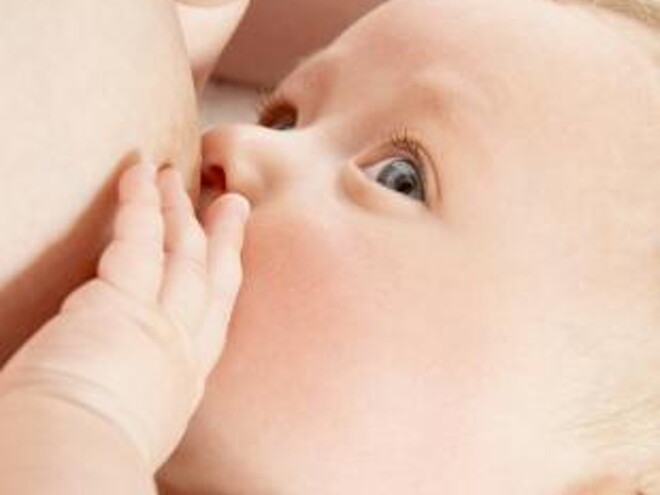
Solutions to your breastfeeding problems
Breastfeeding your baby is not always one long, easy ride. Here's how to overcome the most common hurdles.
Cracked nipples, engorged breasts, mastitis: behind these unpleasant-sounding terms are some of the most frequent complaints that can disrupt breastfeeding. Your baby may also suddenly increase the tempo of its feeds or, alternatively, refuse to feed. Whatever the problem, there's no need to panic. There will always be a solution.
Cracked nipples
- What is it? Small cracks or chapping on the nipples as a result of your baby's mouth being incorrectly positioned when feeding. It has no effect whatsoever on the baby but is very painful for the mother, and is one of the most common reasons for stopping breastfeeding after the first few days or weeks.
- What should I do? Ensure that the nipple is well-placed towards the top of the baby's palate and that the baby's mouth takes in a large part of the areola. Some useful tips also include: drying your breasts after each feed with a sterile compress; placing a few drops of your breast milk on affected zones (this has a healing effect); using disposable breast pads and changing them every few hours so that your breasts stay dry; and above all, using a special moisturizing cream (usually containing lanolin) which staff at the hospital should be able to recommend.
If the cracked nipples persist beyond ten days or so, see a doctor.
Engorged breasts
- What is it? A build-up of milk in the mammary gland. You might even feel a little feverish. The breast is swollen, hard, painful and often red. The nipple may be flattened, which makes it difficult for the baby to latch on and increases the likelihood of cracked nipples!
- What should I do? The only effective treatment is to encourage the milk to flow using every possible means (feeding as much as possible, using a breast pump to "empty" the breast, massaging your breast under a hot shower). You can reduce the swelling (edema), as well as the pain, by applying a cold compress between feeds. Also, of course, make sure that your nursing bra is the right size and doesn't constrain you too much.
If this doesn't work, ask the staff at the hospital or other competent professionals for advice. Bear in mind that you should increase the frequency of feeds in response to any pain or tension in the breast in order to avoid the engorgement evolving into mastitis.
Mastitis
- What is it? This is an inflammation due to the stagnation of milk in the breast. The telltale signs are fever, muscle pain, the breast becomes hard and sometimes red and extreme tiredness. The principal causes are that the baby isn't feeding often enough or for long enough and the breast isn't able to empty itself sufficiently, an over-production of milk or a blocked milk duct. Listen to your body, as mastitis left unchecked can sometimes evolve into an abscess.
- What should I do? Breastfeed your baby as often as necessary, without timing the feed. Empty the breast manually. Massage the painful area before and after the feed, starting at the rib cage and working your way towards the nipple. Get some rest. If after eight to twenty-four hours the symptoms persist and/or you develop a fever, see a doctor quickly.
- My baby wants to feed all the time!
This is normal, especially during the first few weeks which represents a learning period for both mother and child in terms of breastfeeding, the success of which greatly depends on the baby being able to feed "on-demand"! On average, a newborn baby can feed 8 to 12 times per 24 hours. If your baby wants to feed every hour, let them. Generally, it won't last more than a few days, just the time required for the composition of your milk to change according to the baby's new nutritional needs. Don't forget either that your baby feeds both because they are hungry but also to develop their senses (taste, smell, touch) and because they like it and it gives them a sense of security. Breastfeeding reaches cruising speed after around 6 to 8 weeks. Have faith in yourself and in your baby.
My baby refuses to feed
This temporary behavior can be for various reasons and has nothing to do with the quantity or quality of the milk you produce. The most important thing is to stay calm (not easy but vital!). By refusing to feed, your baby is perhaps expressing a fear (sudden flinching on your part when they latch on, for example), pain (ear infection, teething, ulcers, etc.) or surprise (maybe you have changed moisturizing cream and your breasts don't smell the same). Everything will get back to normal within a couple of days or so. A baby will never let itself die of hunger.
Opinion
Taking care of your breasts:
Before each feed:
• wash your hands,
• lightly spray the nipple and carefully dry it with a sterile compress.
After the feed:
•lightly spray the nipple and carefully dry it with a sterile compress,
• if necessary, massage and moisturize using an appropriate cream, particularly if you have cracked nipples.

















